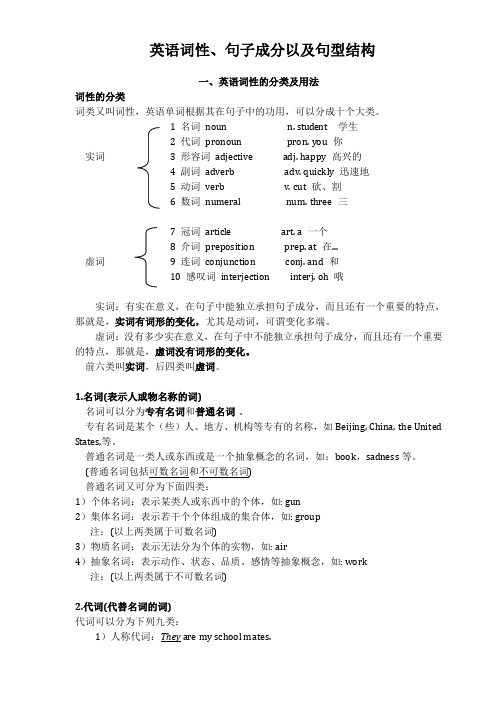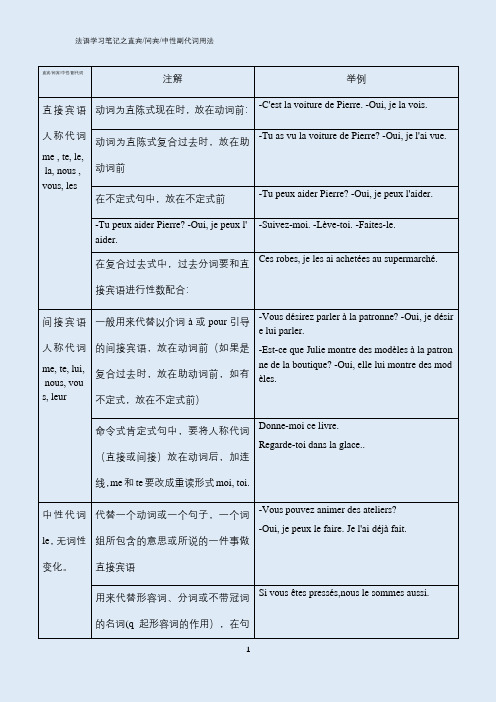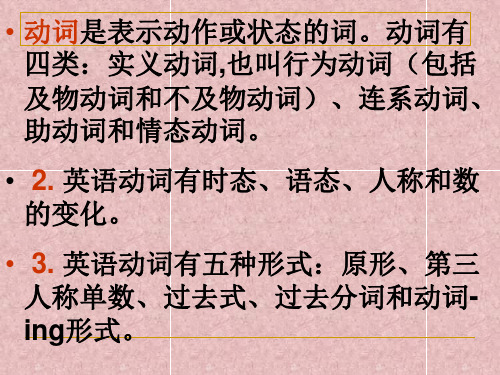直宾和间宾人称代词一般现在时复习
直宾和间宾人称代词一般现在时复习

间接宾语人称代词词形
je tu il/elle nous vous ils/lles me te lui nous vous leur
一般现在时中的 直接宾语人称代词和间接宾语人称代词 EX:-Aimez-vous ce livre?(直宾) (直宾) -Oui,je l'aime. -Non,je ne l'aime pas. -Allez-vous voir Lucie?(助动词结构) (助动词结构) -Oui,je vais la voir. -Non,je ne vais pas la voir.
-Dites-vous bonjour à Paul?(间宾) (间宾) -Oui,je lui dis bonjour. -Non,je ne lui dis pas bonjour. -Pouvez-vous passer ce stylo à Marie? -Oui,je peux lui passer ce stylo. -Non,je ne peux pas lui passer ce stylo.
命令式只有第二人称单复数及第一人称复数形式第一组以er结尾的动词命令式第二人称单数形式要去掉s
直宾和间宾人称代词 在一般现在时中的位置
直接宾语人称代词词形
je tu il elle nous vous ils elles me(me) ( ) te (you) ) le (him,it) , ) la (her,it) , ) nous (us) ) vous (you) ) les (them) ) les (them) )
一般现在时中的 直接宾语人称代词和间接宾语人称代词 放在相关动词之前 肯定句: 肯定句:变位动词前 否定句: 和变位动词之间 否定句:ne和变位动词之间 有助动词: 有助动词:放在动词原形之前 命令式 否定命令式:放在动词之前 否定命令式: 放在相关动词之后 肯定命令式me,te变为 肯定命令式 , 变为moi,toi , 变为
中考英语复习词性与句子成分句型

英语词性、句子成分以及句型结构一、英语词性的分类及用法词性的分类词类又叫词性,英语单词根据其在句子中的功用,可以分成十个大类。
1 名词noun n. stud ent 学生2 代词pronoun pron. you 你实词 3 形容词adjective adj. happy 高兴的4 副词adverb adv. quickly 迅速地5 动词verb v. cut 砍、割6 数词numeral num. three 三7 冠词article art. a 一个8 介词preposition prep. at 在...虚词9 连词conjunction conj. and 和10 感叹词interjection interj. oh 哦实词:有实在意义,在句子中能独立承担句子成分,而且还有一个重要的特点,那就是,实词有词形的变化,尤其是动词,可谓变化多端。
虚词:没有多少实在意义,在句子中不能独立承担句子成分,而且还有一个重要的特点,那就是,虚词没有词形的变化。
前六类叫实词,后四类叫虚词。
1.名词(表示人或物名称的词)名词可以分为专有名词和普通名词.专有名词是某个(些)人、地方、机构等专有的名称,如Beijing, China, the United States,等。
普通名词是一类人或东西或是一个抽象概念的名词,如:book,sadness等。
(普通名词包括可数名词和不可数名词)普通名词又可分为下面四类:1)个体名词:表示某类人或东西中的个体,如: gun2)集体名词:表示若干个个体组成的集合体,如: group注:(以上两类属于可数名词)3)物质名词:表示无法分为个体的实物,如: air4)抽象名词:表示动作、状态、品质、感情等抽象概念,如: work 注:(以上两类属于不可数名词)2.代词(代替名词的词)代词可以分为下列九类:1)人称代词:They are my school mates.2)物主代词:Our friends have great concern for each other.3)反身代词:Take good care of yourselves.4)相互代词:We shoul d help each other.5)指示代词:Who are these peopl e?6)疑问代词:What are you d oing?7)关系代词:She married Li Lei, who is a stud ent too.8)连接代词:Do you know who did it?9)不定代词:Do you know anything about it?代词是非常活跃的词,特别是不定代词,比较复杂,我们要熟练掌握。
法语学习笔记之直宾间宾中性副代词用法

直宾/间宾/中性/副代词注解举例直接宾语人称代词me , te, le, la, nous , vous, les 动词为直陈式现在时,放在动词前:-C'est la voiture de Pierre. -Oui, je la vois.动词为直陈式复合过去时,放在助动词前-Tu as vu la voiture de Pierre? -Oui, je l'ai vue. 在不定式句中,放在不定式前-Tu peux aider Pierre? -Oui, je peux l'aider.-Tu peux aider Pierre? -Oui, je peux l'aider.-Suivez-moi. -Lève-toi. -Faites-le.在复合过去式中,过去分词要和直接宾语进行性数配合:Ces robes, je les ai achetées au supermarché.间接宾语人称代词me, te, lui, nous, vou s, leur 一般用来代替以介词à或pour引导的间接宾语,放在动词前(如果是复合过去时,放在助动词前,如有不定式,放在不定式前)-Vous désirez parler à la patronne? -Oui, je désire lui parler.-Est-ce que Julie montre des modèles à la patronne de la boutique? -Oui, elle lui montre des modèles.命令式肯定式句中,要将人称代词(直接或间接)放在动词后,加连线,me和te要改成重读形式moi, toi.Donne-moi ce livre.Regarde-toi dans la glace..中性代词le,无词性变化。
一般现在时用法讲解复习课程

根据所给动词填空: 1. ___D_o_es___ your sister ___k_n_o_w___ (know) English? 2. Where ____d_o___ you___h_a_ve___ (have) lunch every day? 3. ____D_o_e_s__ she___d_o____(do) the housework every day? 4. Jenny and Danny usually____p_l_a_y___(play) games in the afternoon .
专项练习: ( B ) 1. Jenny ____ in an office. Her parents ____in
a hospital. A work, works B works, work C work , are working D is working , work
( B ) 2. Wang Mei ____ music and often ____ to music. A like; listen B likes; listens C like; are listening D liking ; listen
Does your brother have a wide mouth ? 你弟 弟有一个大嘴巴吗?
(do does 用法歌诀: do、does构成疑问句、否 定句,I、 you 、we 、they 用 do ,he、 she 、 it 用does ,动词一律用原形。)
4. 特殊疑问句
特殊疑问词 +一般疑问句 ?
2024年中考英语语法复习——一般现在时课件

★以y结尾的单词,但y之前有元音字母时, 直接加s,如:say→says,pay→pays等。
★be 动词的第三人称单数是is。
★have的第三人称单数为has。
2)He/She/It does...的不同句式
① 一般疑问句:Does he/she/it (do)...?
陈述句:He goes to school every day.他每天去学校。 一般疑问句:Does he go to school every day?他每天去学校吗?
b.针对地点提问
Where does he draw? 他在哪里画画?
Where does your brother play games? 你弟弟在哪里玩游戏?
c.针对方式提问 How does she go to school? 她是怎么去学校的? How does he get to the airport? 他是怎么到达机场的? d.针对时间提问 When does Danny get up? 丹尼是几点起床的? What time does your father go to work? 你父亲几点上班?
(这里的run,go,see 就是实义动词,在句 中用原形。)
2.一般疑问句:Do you...?
陈述句:I see the rainbow.我看见彩虹 一般疑问句:Do you see the rainbow?你看到彩虹了吗?
陈述句:Ilike myjourney.我喜欢这次旅行。 一般疑问句:Doyou like your journey?你喜欢你这次旅行吗?
be动词在一般现在时态中的各种句型:
1.肯定句:主语+be+其他
You are a good girl. 你是一个好女孩。
中考英语一般现在时专项讲解

课堂内容一般现在时用法和构成内容重点构成和单三变化规律内容难点单三变化规律1.一般现在时的用法用法例句表示经常性、习惯性的动作或存在的状态。
常与频度副词连用。
I often take a walk in the park. These T-shirts are new.表示客观事实、真理。
The sun rises in the east and sets in thewest标志性词:1.every系列:day,year,month,week,morning,afternoon,evening2.频率副词:neverseldomrarelysometimesoftenusuallyalways2.次数oncetwicehree timestwice a weekfour times a weekon Saturdays2.一般现在时构成基本结构:主语+动词原形(do)+其他注意:若主语为第三人称单数,一般在动词原形后加-s或-es。
情况构成方法例词一般情况read→reads love→loves 以s,o,x,ch,sh结尾((小子吃寿司)pass→passes box→boxes teach→teaches wash→washes以辅音字母+ y结尾carry→carries study→studies不规则变化have→has be→am/is/are什么是第三人称单数?第三人称单数举例1.人称代词he, she, it He/She ___________(like)watchingTV.It_______(look) a cat.2.单个人名、地名或称呼作主语Han Mei _____________(look) like hermother.Beijing______(be) in China.Uncle Wang often_________(make)cakes.3.单数可数名词或"this/that/the+单数可数名词"作主语时3. A horse ________(be) a useful animal.This book______(be) yours. That car ________(be) red.The cat_________(be) Lucy’s.4.不可数名词作主语时The milk_______(be) in the glass.5.当数字或字母作主语时"6" ______(be) a lucky number.练一练:(1)We often _______ (play) on the playground.(2)He usually _______ (get) up at six o’clock.(3)There _______ (be) a football match on TV every morning.(4)Daniel and Tommy _______ (be) in Class One.(5)Sandy usually __________ (play) the piano on Sundays.变为三单形式⑴study _______ ⑴run _______ ⑴watch _______ ⑴play _____⑴have _______ ⑴eat _______ ⑴look ______ ⑴cry _______⑴wash _______ ⑴pass _______3.一般现在时的句子转换A.肯定句变为否定句情态动词和be动词后直接加not练一练:I could get you a book. → I __________________get you a book.I am at home when you called me. → I _________at home when you called me.●实义动词之前加do not/don’t,构成否定句。
九年级英语时态复习总结
- 1 - 一般现在时一.一般现在时用于表示现在的状态,如:He is twelve./She is at work./My father is a doctor. 表示经常的或习惯性的动作,通常与alwys,usually,often,sometimes,seldom,three times a day, every day(week,month---)等表示频度的时间状语联用如:I get up at 6:30 every day.表示主语具备的性格和能力等,如:She likes noodles. / They speak French. 表示客观事实或真理,如:The sun rises from the east and set in the west.一般现在时的构成。
1.be动词。
在一般现在时中be动词有三种形式:am, is, are. 其中am只用于主语是I的情况;主语是第三人称单数用is;其他人称用are。
第一人称:指“我”、“我们”,即I,we。
第二人称:指“你”、“你们”,即you。
第三人称:除第一、二人称外都是第三人称。
第三人称单数:包括代词he,she,it,可数名词单数和不可数名词做主语时都是第三人称单数。
第三人称复数:包括代词they,可数名词两个或两个以上为复数,不可数名词没有复数形式。
如:I am a student. Y ou are 11 years old. He is at work. She is a Japanese girl. It is fine today. They are from Korea.2.如果谓语动词不用be动词。
那么,当句子的主语为单数第三人称以外时,在肯定句中,谓语动词用原形。
如:I do my homework every day.We study Chinese, Math and English at school. Y ou work in a supermarket,don’t you? They go to school bu bus. The boys often play basketball on the playground. 当主语为第三人称单数时,在肯定句中,谓语动词要用第三人称单数形式(简称三单形式)。
英语语法轻松学98页—词类-句子成分-直宾间宾-动词-时态(动词短语、名词短语、形容词、副词、指代)
2)P15-P33:总结
例句:橘子红了:翻译:Oranges are red. (这句话对吗?) 总结1:总结中英文的时态对应词汇 1)自助者,天助之:God help those who help themselves. (often, sometimes, always: 经常、有时、总是、会、,天助之:God help those who help themselves.(often, sometimes, always: 经常、有时、总是、会、恒) 2)-ing(正…) 3)-ed(了) 4)have (has/had)done:已经…了 5)will/be going to(要…)
stopped studying. He take courses of law in his spare time. Later he became a lawyer. (You cannot become a technician unless you receive professional training. What is more, there is no logic relationship between an experienced technician and a successful lawyer.) • Amend: My father started his work as a worker in a factory, but through self-study, he became an experienced engineer. But he never stops studying; now he is the chief engineer in a hi-tech company. “The start is never your finish.” He always tells me.
小升初英语一般现在时必考知识点
小升初英语一般现在时必考知识点一般现在时是英语中最基础和最常用的时态之一,它表示当前的动作、状态或者经常性的、习惯性的行为。
在小升初英语考试中,一般现在时是必考的知识点之一,下面将详细介绍一些相关的考点和规则。
1.一般现在时的构成一般现在时的肯定句结构是“主语 + 动词原形”,例如:I play soccer every day.(我每天踢足球。
)其中,主语可以是第一人称单数(I)、第二人称单数(you)、第三人称单数(he/she/it),或者任何人称的复数形式。
2.第三人称单数的变化规则在一般现在时中,第三人称单数的动词需要加上“-s”,例如:He plays soccer every day.(他每天踢足球。
)但是需要注意的是,当动词以“s, sh, ch, x, o”结尾时,要加上“-es”,例如:She watches TV every evening.(她每晚看电视。
)当动词以辅音字母加“y”结尾时,将“y”改为“i”,再加上“-es”,例如:He studies English every morning.(他每天早上学英语。
)3.否定句和疑问句的构成否定句的构成是在助动词“do/does”的后面加上“not”,再加上动词原形,例如:I do not play soccer.(我不踢足球。
)或者简写为:I don't play soccer. 疑问句的构成是把助动词“do/does”放在句首,然后把主语和动词的位置互换,例如:Do you play soccer?(你踢足球吗?)或者简写为:Does he play soccer?(他踢足球吗?)4.经常性、习惯性行为5.客观真理和固定事实一般现在时还用来表达客观真理和固定事实,在这种情况下,动词没有人称和数的变化。
常见的动词有:believe(相信)、know(知道)、think(认为)、understand(理解)、like(喜欢)等,例如:Water boils at 100 degrees Celsius.(水在100摄氏度时烧开。
法语人称代词汇资料总及用法
法语⼈称代词汇资料总及⽤法法语⼈称代词汇总及⽤法主有代词的相关⽤法⼀、主有代词是为了避免名词的重复,同时给这个名词加上所属的概念(⼀般在⽐较句中常常⽤到)1.Cette chambre est plus grande que la mienne.这间房间⽐我的房间⼤。
2.Leur pays est beaucoup moins grand que le notre.他们国家⽐我们国家要⼩的多。
3.Notre dortoir et le leur sont pareils.我们的集体宿舍和他们的是⼀样的。
⼆、主有代词阳性复数形式,可以不代替任何名词,表⽰家⾥⼈、亲友以及与某⼈同属⼀个团体的⼈1.Ils sont heureux de retrouver les leurs.他们和⾼兴和家⼈团聚。
2.Ils ne sont pas des notres .Ne leur dis rien.他们不是⾃⼰⼈,不要告诉他们任何消息。
三、因为主有代词本⾝带有定冠词,所以要考虑缩合问题!!au mien ,du mien ........1.Je m'occupe de mes affaires,je ne m'interesse pas aux leurs.我管我⾃⼰的事,他们的事情我没有兴趣。
2.Il ne pense qu'a ses interets,mais nous ne pensons pas seulement aux notres.他只顾及他的利益,但是我们考虑的不仅仅只是⾃⼰的利益。
注意事项:主有代词的性数与所代替的名词有关,但与占有者⽆关/doc/42a1a4afa3c7aa00b52acfc789eb172dec63996e.html voiture de Pierre; la sienne /doc/42a1a4afa3c7aa00b52acfc789eb172dec63996e.html voiture de Marie; la sienne3.les soeurs de Pierre; les siennes4.les soeurs de Marie; les siennes/doc/42a1a4afa3c7aa00b52acfc789eb172dec63996e.html soeurs de Pierre et Marie; la leur1、Mon fils va a l'ecole,et __le votre/le tien____?我的⼉⼦去学校了,你的⼉⼦呢?Ma fille est belle,et __la votre/la tienne________?我的⼥⼉很漂亮,你的⼥⼉呢?2、Votre chemise est noire,mais ___la notre_______est rouge ,___la leur______est grise. 你们的衬⾐是⿊⾊的,我们的是红⾊的,他们的是灰⾊的。
- 1、下载文档前请自行甄别文档内容的完整性,平台不提供额外的编辑、内容补充、找答案等附加服务。
- 2、"仅部分预览"的文档,不可在线预览部分如存在完整性等问题,可反馈申请退款(可完整预览的文档不适用该条件!)。
- 3、如文档侵犯您的权益,请联系客服反馈,我们会尽快为您处理(人工客服工作时间:9:00-18:30)。
EX:*命令式只有第二人称单复数及第一人称 命令式只有第二人称单复数及第一人称 复数形式,第一组以-er结尾的动词 结尾的动词, 复数形式,第一组以 结尾的动词,命 令式第二人称单数形式要去掉s。 令式第二人称单数形式要去掉 。 Regarde-toi dans la glace!(直宾) !(直宾 !(直宾) Ne me regarde pas! ! Donne-moi ce roman!(间宾) !(间宾 !(间宾) Ne lui donne pas ce roman! !
接宾语人称代词词形
je tu il/elle nous vous ils/elles me te lui nous vous leur
一般现在时中的 直接宾语人称代词和间接宾语人称代词 EX:-Aimez-vous ce livre?(直宾) (直宾) -Oui,je l'aime. -Non,je ne l'aime pas. -Allez-vous voir Lucie?(助动词结构) (助动词结构) -Oui,je vais la voir. -Non,je ne vais pas la voir.
-Dites-vous bonjour à Paul?(间宾) (间宾) -Oui,je lui dis bonjour. -Non,je ne lui dis pas bonjour. -Pouvez-vous passer ce stylo à Marie? -Oui,je peux lui passer ce stylo. -Non,je ne peux pas lui passer ce stylo.
一般现在时中的 直接宾语人称代词和间接宾语人称代词 放在相关动词之前 肯定句: 肯定句:变位动词前 否定句: 和变位动词之间 否定句:ne和变位动词之间 有助动词: 有助动词:放在动词原形之前 命令式 否定命令式:放在动词之前 否定命令式: 放在相关动词之后 肯定命令式me,te变为 肯定命令式 , 变为moi,toi , 变为
直宾和间宾人称代词 在一般现在时中的位置
直接宾语人称代词词形
je tu il elle nous vous ils elles me(me) ( ) te (you) ) le (him,it) , ) la (her,it) , ) nous (us) ) vous (you) ) les (them) ) les (them) )
